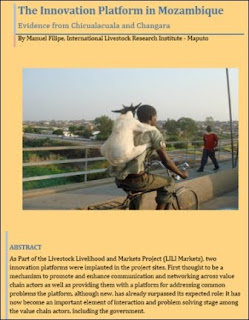A novel approach to enhancing livestock commercialization is helping to improve market participation by smallholder livestock keepers in semi-arid Mozambique.
The Innovation Platform (IP) approach uses value chain analysis to identify challenges and constraints to livestock production and marketing. Based on these, opportunities to overcome the bottlenecks are then sought.
By collectively engaging all value chain actors, the IP approach strengthens linkages among sector stakeholders thus helping to enhance efficiency through better alignment of livestock production and market requirements. In addition, improved flow of market information results in reduced transaction costs and greater market efficiency.
The Livestock and Livelihoods (LILI) project (Livestock and Livelihoods: Improving market participation of small-scale livestock producers), implemented from 2007, used the IP approach to contribute towards achieving the project's objectives.
These objectives were to: (1) improve market participation of small-scale goat and cattle keepers in semi-arid regions of Mozambique, Namibia and Zimbabwe; (2) evaluate constraints to and opportunities for commercialization of smallholder production of goats and cattle; (3) test and evaluate alternative livestock marketing and input delivery systems; (4) assess the impact of market-led technology change on household incomes; and (5) establish an effective communication strategy to facilitate networking and exchange of information among sector stakeholders.
The LILI project was collaboratively undertaken by the International Crops Research Institute for Semi-Arid Tropics (ICRISAT), the International Livestock Research Institute (ILRI), the National Agricultural Research Institute of Mozambique (IIAM), the Matopos Research Station of Zimbabwe and the Namibian National Farmers' Union (NNFU).
Some of the experiences of implementing the IP approach in the LILI project are documented in an April 2010 report, The innovation platform in Mozambique: Evidence from Chicualacuala and Changara, by Dr Manuel Filipe, a scientist formerly with ILRI's Market Opportunities research theme.
"The Innovation Platform can be a platform for constructive debate and problem solving," Dr Filipe notes in his report. "The market actors as well as the local authorities have embraced it and it is being used as an entry point for other initiatives such as training and planning, among others," he adds.
The LILI project was funded by the European Union and supported by the Southern African Development Community.
Download the report
Citation
Filipe M. 2010. The innovation platform in Mozambique: Evidence from Chicualacuala and Changara. Project report. ILRI (International Livestock Research Institute), Nairobi. 18pp.
The Innovation Platform (IP) approach uses value chain analysis to identify challenges and constraints to livestock production and marketing. Based on these, opportunities to overcome the bottlenecks are then sought.
By collectively engaging all value chain actors, the IP approach strengthens linkages among sector stakeholders thus helping to enhance efficiency through better alignment of livestock production and market requirements. In addition, improved flow of market information results in reduced transaction costs and greater market efficiency.
The Livestock and Livelihoods (LILI) project (Livestock and Livelihoods: Improving market participation of small-scale livestock producers), implemented from 2007, used the IP approach to contribute towards achieving the project's objectives.
These objectives were to: (1) improve market participation of small-scale goat and cattle keepers in semi-arid regions of Mozambique, Namibia and Zimbabwe; (2) evaluate constraints to and opportunities for commercialization of smallholder production of goats and cattle; (3) test and evaluate alternative livestock marketing and input delivery systems; (4) assess the impact of market-led technology change on household incomes; and (5) establish an effective communication strategy to facilitate networking and exchange of information among sector stakeholders.
The LILI project was collaboratively undertaken by the International Crops Research Institute for Semi-Arid Tropics (ICRISAT), the International Livestock Research Institute (ILRI), the National Agricultural Research Institute of Mozambique (IIAM), the Matopos Research Station of Zimbabwe and the Namibian National Farmers' Union (NNFU).
Some of the experiences of implementing the IP approach in the LILI project are documented in an April 2010 report, The innovation platform in Mozambique: Evidence from Chicualacuala and Changara, by Dr Manuel Filipe, a scientist formerly with ILRI's Market Opportunities research theme.
"The Innovation Platform can be a platform for constructive debate and problem solving," Dr Filipe notes in his report. "The market actors as well as the local authorities have embraced it and it is being used as an entry point for other initiatives such as training and planning, among others," he adds.
The LILI project was funded by the European Union and supported by the Southern African Development Community.
Download the report
Citation
Filipe M. 2010. The innovation platform in Mozambique: Evidence from Chicualacuala and Changara. Project report. ILRI (International Livestock Research Institute), Nairobi. 18pp.



No comments:
Post a Comment